Finished reading Nowhere People by Paulo Scott.
This novel describes issues bothering Brazil's indigenous population, particularly dispossessed Guarani Indians.

Finished reading Nowhere People by Paulo Scott.
This novel describes issues bothering Brazil's indigenous population, particularly dispossessed Guarani Indians.

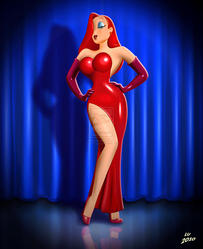
There was a GNIer called KAR
and this pic. of Jessica was her avatar.
She stood dressed in red as she threw back her head
Saying, "my tits have blocked the view of my car"
Finished reading JOSEPH CONRAD: A Biography by Jeffrey Meyers.
Conrad was an amazing man. Born in Russian-occupied Poland in 1857, he emigrated to England, learned the English language there, and eventually wrote some of the best books in English Literature. He is one of my favourite authors. When I departed from Guyana 18 years ago, one of the books I brought along to Canada was Conrad's novel Nostromo.
Jeffrey Meyers' biography of Conrad is excellent, well researched and readable.
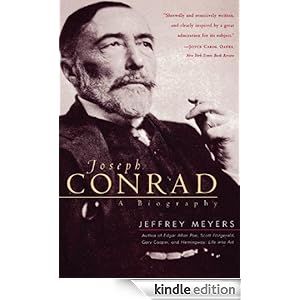
Finished reading BELONGING: The Paradox of Citizenship by Adrienne Clarkson.
This book comprises texts of the CBC-sponsored 2014 Massey Lectures delivered by Ms Clarkson, Canada's 26th Governor-General and former CBC journalist.
She argues that there needs to be a sense of belonging between the individual and society. She gives examples in ancient Greece, France, Bhutan and Canada.
She shows how Canada has distinguished itself over time as a unique, caring, forgiving, pluralistic/multicultural society. "We belong to each other in this country," she says.
Acknowledging that Canada still has flaws to straighten out, Ms Clarkson says immigrants must be prepared to accept the bad with the good when they arrive here.
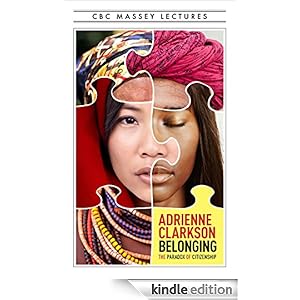
Finished reading SOLAR by bestselling and prizewinning English novelist Ian McEwan. It's about a brilliant physicist who won the Nobel Prize and wide acclaim in scientific circles but who has a messy personal life.
This is the first Ian McEwan novel I've read and I will certainly get hold of more of his books. A fine writer he is.

Finished reading The Metamorphosis, a novella by Czech-born writer Franz Kafka. This is a simple tale that can be interpreted in more ways than one. A young travelling salesman, virtual breadwinner for ageing parents and young sister, wakes up one morning to find himself transformed into a cockroach-like insect. How does he live after that? What effect his metamorphosis has on his family?

This is most likely the last book I've read for 2014, making it #42, seven less books than I read last year. My reading plan for 2015 includes a number of classics. At last, I will take up Leo Tolstoy's War and Peace.
will start "The King's Deception" by Steve Berry, from the blurb i read it looks good.

The day after Black Friday last week was called Small Business Saturday in the United States. President Obama, with his daughters, stopped by his local bookstore Politics & Prose to pick up some books.
Here's a full list of the First Family's purchases:
All the Light We Cannot See by Anthony Doerr
Nora Webster by Colm Toibin
The Narrow Road to the Deep North by Richard Flanagan
The Laughing Monsters by Denis Johnson
Heart of Darkness by Joseph Conrad
Age of Ambition: Chasing Fortune, Truth and Faith in the New China byEvan Osnos
Being Mortal: Medicine and What Matters in the End by Atul Gawande
Brown Girl Dreaming by Jacqueline Woodson
Cartwheeling in Thunderstorms by Katherine Rundell
Redwall by Brian Jacques
Mossflower by Brian Jacques
Mattimeo by Brian Jacques
Junie B. Jones and the Stupid Smelly Bus by Barbara Park
Junie B. Jones and a Little Monkey Business by Barbara Park
A Barnyard Collection: Click, Clack, Moo and More by Doreen Cronin
I Spy Sticker Book and Picture Riddles by Jean Marzollo
Nuts to You by Lynn Rae Perkins
I lived a couple of blocks from that bookstore for some 10 years and spent lots of evenings there listening to lectures or readings by authors and getting my books signed. It is a cool place to walk to in the evenings to browse and read. They let you stay as long as you want.
Since the start of this year I've finished reading the following:
[1] CONSPIRATOR: Lenin in Exile by Helen Rappaport
[2] SWEET TOOTH by Ian McEwan
[3] THREE NIGHTS IN HAVANA by Robert Wright
[4] MY YEARS AS PRIME MINISTER by Jean Chrétien
[5] THE RELUCTANT FUNDAMENTALIST by Mohsin Hamid
Finished reading The Metamorphosis, a novella by Czech-born writer Franz Kafka. This is a simple tale that can be interpreted in more ways than one. A young travelling salesman, virtual breadwinner for ageing parents and young sister, wakes up one morning to find himself transformed into a cockroach-like insect. How does he live after that? What effect his metamorphosis has on his family?

This is most likely the last book I've read for 2014, making it #42, seven less books than I read last year. My reading plan for 2015 includes a number of classics. At last, I will take up Leo Tolstoy's War and Peace.
The Metamorphosis is a great piece of writing. If you like Russian writers I highly recommend Nikolai Gogol. For me he is number one.
Finished reading The Metamorphosis, a novella by Czech-born writer Franz Kafka. This is a simple tale that can be interpreted in more ways than one. A young travelling salesman, virtual breadwinner for ageing parents and young sister, wakes up one morning to find himself transformed into a cockroach-like insect. How does he live after that? What effect his metamorphosis has on his family?

This is most likely the last book I've read for 2014, making it #42, seven less books than I read last year. My reading plan for 2015 includes a number of classics. At last, I will take up Leo Tolstoy's War and Peace.
The Metamorphosis is a great piece of writing. If you like Russian writers I highly recommend Nikolai Gogol. For me he is number one.
Anta, some time ago I read Dead Souls by Gogol. Many years ago in Guyana I had read his short story The Overcoat. I must read that story again. Touching.
Finished reading The Metamorphosis, a novella by Czech-born writer Franz Kafka. This is a simple tale that can be interpreted in more ways than one. A young travelling salesman, virtual breadwinner for ageing parents and young sister, wakes up one morning to find himself transformed into a cockroach-like insect. How does he live after that? What effect his metamorphosis has on his family?

This is most likely the last book I've read for 2014, making it #42, seven less books than I read last year. My reading plan for 2015 includes a number of classics. At last, I will take up Leo Tolstoy's War and Peace.
The Metamorphosis is a great piece of writing. If you like Russian writers I highly recommend Nikolai Gogol. For me he is number one.
Anta, some time ago I read Dead Souls by Gogol. Many years ago in Guyana I had read his short story The Overcoat. I must read that story again. Touching.
Absolutely. He has a collection of short stories on the same level as Poe. Also Taras Bulba is a masterpiece, and quite different from the movie.

Finished reading the novel SHE by H. Rider Haggard. Since this book was first published 128 years ago it has never been out of print. It's about a journey three Englishmen made to 19th century east Africa to find out about an ancient family history. Adventures, misadventures, tragedy, and a living 2,000 year-old-white queen combine to make the story interesting.
When I was 11 years old I borrowed SHE from the Uitvlugt Community Centre Library but couldn't understand anything and returned it mostly unread. Now, 53 years later I decided to borrow it from the Toronto Public Library and I like the story so much I wonder why it took me so long to get my hands on it.


Bookie, hubby beat you in reading...
One day I asked him when last he read a novel... he said to me "I read 3 to 4 books per day; 5 days a week. That's enough reading for me."
I am sure you get what he is hinting about... ![]()
Finished reading Glimpses of a Global Life by Shridath Ramphal. I am indebted to this outstanding Guyanese whom I've long admired and respected since the early 1970s when he was Minister of Foreign Affairs. His public speaking skills were on par with Forbes Burnham's. His writing skills are just as remarkable. This book retraces his working life from constitutional lawyer in Jamaica to Commonwealth Secretary General to chancellor of three universities and so on.

I will be re reading 'Miguel Street'...I love that book.
Bogart in jail
Bogart in jail
Bogart actually existed, you know.
Many years later, VS Naipaul traveled to Venezuela and met him there. By then, Bogart had outlived his Miguel Street personality and was more subdued.
Bogart in jail
Bogart actually existed, you know.
Many years later, VS Naipaul traveled to Venezuela and met him there. By then, Bogart had outlived his Miguel Street personality and was more subdued.
wow I had no idea, tnks for letting us know.
i like 'Man Man' and 'Laura doux doux' makes me laugh everytime i remember that part in the book![]()
Finished reading The French Lieutenant's Woman by John Fowles. I love this novel. The narrator is telling in 1969 a story set in the south of England between 1867 and 1869. That was a time of Victorian puritanism but, as the novel shows, also a time of hypocrisy and double standards. Class differences of the main characters brought out that hypocrisy more.
At the beginning of the novel the main character has the reputation of a prostitute but we discover later that she was actually a virgin. A woman of the lower class, she is not accepted as normal even by her social peers. She thinks differently and acts differently. I like such kinds of women.
![]()

Finished reading TO THE RIVER by Olivia Laing.
The author writes about hiking from the source of the River Ouse in Sussex England to its mouth, a distance of 46 miles. The journey lasted one week. She describes in extraordinary detail scenes along the way, and recalls the history associated with some places. She reminisces about the English writer Virginia Woolf who had deliberately drowned herself in the same river in 1941. I'm impressed with Ms Laing's deep knowledge of trees and other plants, birds and insects, so numerous along her path and she names them all.

Finished reading WHAT POETS ARE LIKE: Up and Down with the Writing Life by Gary Soto.
Shame on me, I had never heard about Gary Soto until last week when my library recommended him to me. He is a Mexican-American or Chicano poet, teacher, essayist and filmmaker. His track record is impressive: 14 poetry collections, 21 young adult/children's books, 1 play, 7 memoirs and 2 films. He won many awards.
Fresno City College in California has honoured him with a Gary Soto Literary Museum.
This particular book is a collection of personal essays. They are witty, informative, and inspiring. I'll certainly check out Gary Soto's other books.

Almost finished On A Pale Horse by Piers Anthony. Excellent book.
Struggling to finish 'The Alchemist'....hoping to wrap it up this weekend, working 12 hours a day recently, just started a new job in February.
The Alchemist. ahhhh yessss, brings back great memories...Ohhhh yeahhh that was a really good book.
Reading "Riding for the brand' by Louis Lamour, love his books.
Finished reading My Life in Middlemarch by Rebecca Mead.
Middlemarch is an 800+ page novel by the English writer George Eliot whose real name was Mary Ann Evans.
Rebecca Mead, a middle-aged British-born staff writer of the New Yorker magazine, first read Middlemarch in her teens and became so fascinated with the novel that she has re-read it time over time. "I think Middlemarch has disciplined my character," she writes. "I know it has become part of my own experience and my own endurance."
In My Life in Middlemarch Mead explores the life and world of George Eliot, including the English midlands of Warwickshire, the real-life setting of the fictional place, Middlemarch.

Reading "Riding for the brand' by Louis Lamour, love his books.
Used to read those way back in High School.
Reading "Riding for the brand' by Louis Lamour, love his books.
i have is collection grow up on his books
Alena06, yes did that in high school too..i uses to fight with my brother whenever he borrowed them to read them first ![]() .
.
Warrior, I have some of his books, ever so often will go back and read them.
Alena06, yes did that in high school too..i uses to fight with my brother whenever he borrowed them to read them first ![]() .
.
Warrior, I have some of his books, ever so often will go back and read them.
The school library was my source. I had a few keepsakes though, but left them behind when I left Guyana. One of my faves was 'To kill a mockingbird'.. Got it when I came first in my High School class.
Happy Saturday all! Enjoy the fresh air. ![]()
Finished reading My Father's House: In Search of a Lost Past by Matthew Carr. The author is the eldest son of Bill Carr, a lecturer at the University of Guyana from 1966 until his death in 1991.
Matthew Carr, along with his mother and three siblings, had followed Bill Carr first to Jamaica where he lectured for 6 years at the UWI Mona Campus, thence to Guyana. They stayed in Guyana only 10 months and were sent packing back to England.
Bill Carr established himself in Guyana as an outstanding lecturer in English Language and English Literature, and as a competent dramatic actor at the Theatre Guild. He was less known as a PPP activist and Mirror newspaper columnist who wrote under the name Little Boy Blue. He however had his demons, principally alcoholism, and there was hardly a rum shop in and out of Georgetown that he hadn't visited.
I knew all these things before reading this book. I was shocked to discover within its pages that Bill Carr was a compulsive wife beater and a violently abusive father.
Matthew Carr retraces his steps back to Guyana five years after his father's death, visiting his grave and meeting Bill's Guyanese wife and friends to search for answers regarding Bill's actions and motivations.
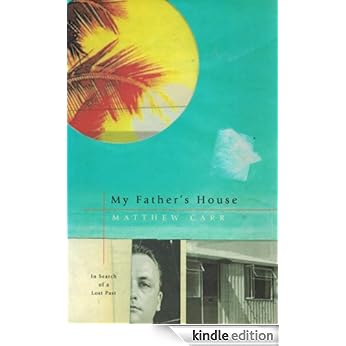

* Arrite! Gabriel Tarde's The Laws of Imitation is next on my list.
Read this:
A common fallacy is the idea that the majority sets the patterns and trends of social, economic and religious life. But history reveals quite the opposite: the majority copies or imitates the minority and this establishes the long run developments and socio economic evolutions.
* This looks like it will be an interesting read--it's true---the crowd always follow the leaders.
* Check this ![]() :
:
https://guyana.crowdstack.io/topic/re...ry-is-100-guaranteed
Rev
Dumbo, leave that nonsense in Political. Only an idiot would send a link showing they are one of the most despicable persons on the board.
* Michael Crichton's "Travels" is next on my list.
Often I feel I go to some distant region of the world to be reminded of who I really am.
When Michael Crichton -- a Harvard-trained physician, bestselling novelist, and successful movie director -- began to feel isolated in his own life, he decided to widen his horizons. He tracked wild animals in the jungles of Rwanda. He climbed Kilimanjaro and Mayan pyramids. He trekked across a landslide in Pakistan. He swam amid sharks in Tahiti.
Fueled by a powerful curiosity and the need to see, feel, and hear firsthand and close-up, Michael Crichton has experienced adventures as compelling as those he created in his books and films. These adventures -- both physical and spiritual -- are recorded here in Travels, Crichton's most astonishing and personal work
Rev
Just finished Sugar Ray Leonard's autobiography The Big Fight. Excellent reading for anyone who follows fight sports, great just to understand what it takes to be at the top.
* Curtly Ambrose's "Time To Talk" is next on my list.
* What a great West Indian fast bowler! He is one of my favorites. He has been described as "one of the leading--and most lethal--fast bowlers of all time.
* During his career Curtly was notorious for his silence---he rarely spoke to the press---his mantra was "Curtly talks to no one."![]()
* Oh well! Curtly is now talking in his autobiography nicely titled "TIME TO TALK".
* This should be a fun read.
Rev
* Arrite! Next on my list is "One hundred years of Solitude" by Nobel Prize winner Gabriel Garcia Marquez.
* Someone once said:
Solitude is the soul's holiday, an opportunity to stop doing for others and to surprise and delight ourselves instead.
* I am curious to read what Gabriel Marquez has to say in his book that has been described as "one of the 20th century's most enduring works."
Rev
* Arrite! Next on my list is "One hundred years of Solitude" by Nobel Prize winner Gabriel Garcia Marquez.
* Someone once said:
Solitude is the soul's holiday, an opportunity to stop doing for others and to surprise and delight ourselves instead.
* I am curious to read what Gabriel Marquez has to say in his book that has been described as "one of the 20th century's most enduring works."
Rev
Excellent choice, Rev. I read it 27 years ago. In fact, Gabriel Garcia Marquez is/was one of my favourite authors.
Finished reading Adam Bede by the 19th century English novelist George Eliot. The story is based on a real life infanticide in 1802. Eliot gives a nice realistic portrayal of life in feudal society. As I mentioned earlier, my reading plan will include more classics this year.

Finished reading HIGH SEAS MISSIONARIES: Caribbean, Guyana & Amazonia 1991 by William Cooper. The author relates his experience with a group called Youth With A Mission as they ferried relief supplies and preached the Gospel in the Caribbean, Guyana and Brazil. I like people who put their lives on hold temporarily to serve a higher cause, whether in politics or religion or the environment or just plain charity. Honor before money.

* I saw Bill Gates recommending Darrel Huff's "How To Lie With Statistics" at a TED conference, so I figure I'll take a peek.![]()
* This book was first published in 1954. The Rev hopes to pick up a few useful tips on how to lie using stats.![]()
Rev
* I saw Bill Gates recommending Darrel Huff's "How To Lie With Statistics" at a TED conference, so I figure I'll take a peek.![]()
* This book was first published in 1954. The Rev hopes to pick up a few useful tips on how to lie using stats.![]()
Rev
I couldda swear you had mastered this book already.![]()
I couldda swear you had mastered this book already.![]()
* The master always needs a refresher to keep sharp my bwoy.![]() You ought to know that.
You ought to know that.![]()
Rev
PETER HOPKIRK'S 'TRESPASSERS ON THE ROOF OF THE WORLD'
For nineteenth-century adventures, Tibet was the prize destination, and Lhasa, its capital situated nearly three miles above sea level, was the grandest trophy of all.
For hundreds of years men set out to explore the secrets of Tibet, hidden high in the mountains of Asia and long known as “the roof of the world.” In this collection of accounts, Hopkirk examines the various expeditions that set out to explore Tibet’s mysteries and their successes and failures.
* I'm into reading books on adventures these days.
Rev
Finished reading Falls of Death by prolific Guyana-born novelist Christopher Nicole.
In 1942 a plane carrying three male and two female Americans disappeared into the jungles of British Guiana. The plane was en route to make a sightseeing tour of the famous Kaieteur waterfall. Seventy years later, the great grand-daughter of one the crew decides to investigate what happened to the plane and her great grandpa. She is also determined to find out if the disappearance might be linked to a series of recent mysterious deaths in the vicinity of the falls, leading her into a deadly adventure of her own.
After reading this book, you will never think about Kaieteur Falls as you did previously.
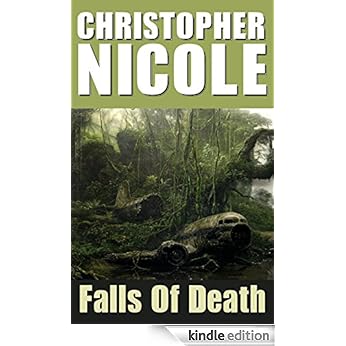
May I suggest the following ... All the books members are recommending to read be listed somewhere in the main page header named "Book Club" or something like that mostly because - the thread is 10 pages long and it's going to get longer; lots to read ...
A Good Read is "Tuesdays with Morrie" - (I've most of Mitch Albom novels - not all are as well written)
Genres: Sociology, Fiction, Biography, Biographical Novel
* I saw Bill Gates recommending Darrel Huff's "How To Lie With Statistics" at a TED conference, so I figure I'll take a peek.![]()
* This book was first published in 1954. The Rev hopes to pick up a few useful tips on how to lie using stats.![]()
Rev
Interesting book but not as interesting as Freakonomics. Actually, I should not say one is better than the other since they are of the same genre...illustrating the pitfalls in the interrogating of reality in these fields and the beauty in them when used to unearth truths to nagging questions.
* Arrite! Next on my list is "One hundred years of Solitude" by Nobel Prize winner Gabriel Garcia Marquez.
* Someone once said:
Solitude is the soul's holiday, an opportunity to stop doing for others and to surprise and delight ourselves instead.
* I am curious to read what Gabriel Marquez has to say in his book that has been described as "one of the 20th century's most enduring works."
Rev
Read this when I was in College a long time back.

This book is a wide-ranging and interdisciplinary examination and critique of meat consumption by humans, throughout their evolution and around the world. Setting the scene with a chapter on meat’s role in human evolution and its growing influence during the development of agricultural practices, the book goes on to examine modern production systems, their efficiencies, outputs, and impacts.
* Well, This book will be in my mail box later this week. I am a meat eater---love a good steak, a good hamburger, and good spare ribs. Oh! I had some tasty bunjal duck last Saturday.![]() Anyway, I am curious to read what Vaclav Smil has to say in his highly recommended book.
Anyway, I am curious to read what Vaclav Smil has to say in his highly recommended book.
Rev
"There is no friend as loyal as a book." - Ernest Hemingway
no wonder you gays all sound boring none of of you read playboy ![]()
no wonder you gays all sound boring none of of you read playboy ![]()
Warria, is it true you studied the Kama Sutra from cover to cover? ![]()
I doan think warrior is aware of what he said in his post, hehehe
Finished reading THE GLASS PALACE, a historical novel by Indian writer Amitav Ghosh. It is set in Burma, India and Malaya. The plot is bracketed with two important events in Burma's history: the 1885 removal and deportation of King Thebaw and his family by the British and the 1996 house arrest of Burmese politician Aung Sang Suu Kyi.


Finished reading THE WOODEN HORSE by Eric Williams. I had attempted to read this novel 52 years ago when I was a teenager but abandoned it after a few pages. When 13 inmates recently escaped from the Lusignan prison by tunnelling, I remembered THE WOODEN HORSE and borrowed the e-book version from Toronto Public Library. I approached the story with a lifetime of experiences and a fair knowledge of prison systems gained from reading and two personal visits to prisons in Cuba and Guyana in 1989.
THE WOODEN HORSE is based on the real-life successful escape by three Second World War British prisoners-of-war who had been captured in Germany. Eric Williams, an airman whose bomber was shot down, was one of the trio. They built a wooden vaulting horse, placed it at a certain spot in the prison compound every day ostensibly for physical exercises, and dug a 150-foot tunnel outwards to freedom within a few months. That escape from prison was an ordeal but the greater ordeal was to get out of Germany and German-occupied European countries and return to Britain.
While reading this gripping novel I wondered how many other prisoners it had inspired after publication in wartime and peace time.
I remembered reading this when I was doing Greek Mythology in school
Not the same horse story buddy.
Amral posted:I remembered reading this when I was doing Greek Mythology in school
I think you're mistaking The Wooden Horse for The Trojan Horse.
Yeah you are right
Next you rant gonna mix up Trojan horse with Trojan condoms
In 1975, my big brother sent a novel for me from NY called The Moonflower by Phillis A. Whitney. It's a suspenseful romantic thriller about life in Japan after the Hiroshima and Nagasaki atomic bombings. It was so gripping that my entire high school class passed it to each other and read it, and by the time I got it back, it was falling apart. Through the years I always remembered the book and the story. Two months ago I ordered it from Amazon and read it again in 5 days, like I used to read in my teens.
You had me up until,"suspenseful"
Leonora posted:In 1975, my big brother sent a novel for me from NY called The Moonflower by Phillis A. Whitney. It's a suspenseful romantic thriller about life in Japan after the Hiroshima and Nagasaki atomic bombings. It was so gripping that my entire high school class passed it to each other and read it, and by the time I got it back, it was falling apart. Through the years I always remembered the book and the story. Two months ago I ordered it from Amazon and read it again in 5 days, like I used to read in my teens.
One of the most emotional plays I have filmed, was a school plays called 'A Thousand Cranes'.
It was about a twelve year old Japanese girl who died from radiation, ten years after the bomb at Hiroshima.
About 100 Canadian students were taught songs in Japanese and the costumes were all authentic Japanese, even the slippers.
The student who played the dying Japanese girl was so real, that there were sniffing in the audience and I could not keep a dry eye through the camera lens.
I gave a copy to a Japanese lady in my aerobics class and she replied with similar emotions.
Five hundred paper cranes were sent from Japan for the play, by an ex student. A copy of the video was sent to him in Japan and shown on their TV station, with Japanese subtitles.
.
Gilbakka posted:
Finished reading THE WOODEN HORSE by Eric Williams. I had attempted to read this novel 52 years ago when I was a teenager but abandoned it after a few pages. When 13 inmates recently escaped from the Lusignan prison by tunnelling, I remembered THE WOODEN HORSE and borrowed the e-book version from Toronto Public Library. I approached the story with a lifetime of experiences and a fair knowledge of prison systems gained from reading and two personal visits to prisons in Cuba and Guyana in 1989.
THE WOODEN HORSE is based on the real-life successful escape by three Second World War British prisoners-of-war who had been captured in Germany. Eric Williams, an airman whose bomber was shot down, was one of the trio. They built a wooden vaulting horse, placed it at a certain spot in the prison compound every day ostensibly for physical exercises, and dug a 150-foot tunnel outwards to freedom within a few months. That escape from prison was an ordeal but the greater ordeal was to get out of Germany and German-occupied European countries and return to Britain.
While reading this gripping novel I wondered how many other prisoners it had inspired after publication in wartime and peace time.
Very, very good book. I read it back in Guyana. I was lucky to find a copy over here a couple of years ago. It's of the same calibre as "The Great Escape".

Finished reading THE BONESETTER'S DAUGHTER by American novelist Amy Tan. Published 16 years ago, the story deals with the relationship between Ruth, a middle-aged Chinese-American woman, and her aging mother fast losing her memory. A relationship that was not always harmonious. Ruth learns through her mother's written account about her family and ancestors in China. The novel gives a realistic perspective of rural life in China up to WW2. And a snapshot of Chinese immigrants' experience in California, as well as their offspring's life.
For generations Ruth's ancestors ran a cottage industry producing ink sticks for the literate Chinese market. Before writing anything, one would grind part of an ink stick into an ink stone and add drops of water to make liquid ink. According to Amy Tan, one's frame of mind determined the final result, i.e. the proper depiction of Chinese language characters on paper. A fascinating process, I think.
THE BONESETTER'S DAUGHTER is a page turner.
Just read Song Of Solomon by Tony Morrison - amazing story-telling.
antabanta posted:Just read Song Of Solomon by Tony Morrison - amazing story-telling.
Seems like you and I got a brainwave to read women. Toni Morrison. Amy Tan.
And now Iran-born Azar Nafisi, whose memoir THE REPUBLIC OF IMAGINATION I finished reading a few minutes ago. This book came out three years ago. It discusses mainly three American novels: [1] "Huckleberry Finn" by Mark Twain, [2] "Babbit" by Sinclair Lewis, [3] "The Heart Is A Lonely Hunter" by Carson McCullers. To a lesser extent Nafisi also gives her thoughts on "Go Tell It on the Mountain" by James Baldwin.
In my reading experience, one book often leads to another. So, I didn't waste time to borrow a digital copy of James Baldwin's novel from my library just now. Will start it tonight.

Gilbakka posted:Seems like you and I got a brainwave to read women. Toni Morrison. Amy Tan.
Must be. I just started Bird By Bird by Anne Lamott.

Finished reading "Go Tell It on the Mountain" by African-American writer James Baldwin. Published in 1953, it is Baldwin's first novel and it's semi-autobiographical. It focuses on the 14th birthday of a black boy in Harlem. His father, who is actually his step father unknowing to him, gives him a brutal belting on his special day. His step father is sexton of a small church whose worshipers are African American.
This novel is set in Jim Crow USA, a period of racial segregation and intense persecution of blacks by white people. All the characters in the story are affected negatively in that environment. But they maintain strong Christian faith and hope for betterment.

Finished reading THE COMPANY WE KEEP by Robert Baer and Dayna Baer. The authors worked for the US Central Intelligence Agency [CIA]. This is their memoir, published in 2011. It takes the reader from the US to France, the former Yugoslavia, Tajikistan, Russia, Morocco, Lebanon and Iraq.
Robert and Dayna met while on assignment in Sarajevo. Both were married but estranged from their partners due to duty. Before the book ends, Robert and Dayna are husband and wife who left the CIA but whose professional past follows them everywhere.
I have read a fair number of fictional spy thrillers. This non-fiction book shows that spies' lives are just as intriguing, daring, death-defying, exciting and romantic as that of their fictional counterparts.

Finished reading STORY OF A DEATH FORETOLD by Oscar Guardiola-Rivera. Salvador Allende was a democratically elected President of Chile. He ran a coalition government from September 1970 until his violent death in a coup on September 11, 1973.
This book is highly analytical, dealing with Allende's political career, his ascension to power, the destabilization of his government by big Chilean and US businesses and the Nixon Administration and, critically, the Chilean Armed Forces. The main goal was to prevent the consolidation of "another Cuba" in Latin America.
STORY OF A DEATH FORETOLD was published on the 40th anniversary of Allende's death.
Just finished Home by Toni Morrison - absolutely brilliant.

Finished reading THE SHADOW OF THE CRESCENT MOON by Afghanistan-born Pakistani writer Fatima Bhutto.
This novel was published in 2013 and is set mainly in Waziristan which lies on the border with Afghanistan. For decades that region has been problematic for successive Pakistani governments. There have been insurgencies and deadly Sunni-Shia conflicts. The rest of the country regard Waziristan people as untrustworthy separatists.
It is Eid in the story. A Friday. Three brothers decide for the first time to worship at three separate mosques. They don’t want a bomb blast to kill them together, leaving their widowed mother in terrible grief. What happens this Eid day will be tragic for this Shia family anyway.
This is an impressive debut novel by Fatima Bhutto.
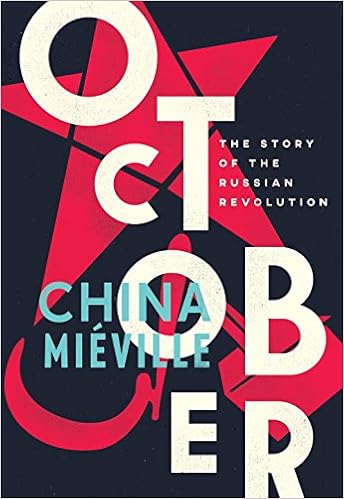
Finished reading “OCTOBER: The Story of the Russian Revolution” by China Miéville. This book was published just a few months ago in time for the 100th anniversary of the Russian Revolution.
There were two revolutions in Russia in 1917. One in February [old-style calendar] that overthrew Tsar Nicholas II and installed a provisional government. The other in October that kicked out the provisional government and established what was touted as a socialist government led by V. I. Lenin.
The October revolution was by far the more significant of the two, with far-reaching consequences internationally.
China Miéville starts his book in January 1917 and devotes succeeding chapters chronologically to the months that followed up to October.
In his Epilogue he writes: “... the months and years that follow [October 1917] will see the revolution embattled, assailed, isolated, ossified, broken. We know where this is going: purges, gulags, starvation, mass murder.”
But the author says the October 1917 revolution is a basic yardstick to measure social change globally.
“It is not for nostalgia’s sake that the strange story of the first socialist revolution in history deserves celebration. The standard of October declares that things changed once, and they might do so again,” he writes.
Reading "All The Pretty Horses."
antabanta posted:Reading "All The Pretty Horses."
That's a nice novel by Cormac McCarthy. I read it two years ago. The guy's writing style is unusual but perfectly clear.
Gilbakka posted:antabanta posted:Reading "All The Pretty Horses."
That's a nice novel by Cormac McCarthy. I read it two years ago. The guy's writing style is unusual but perfectly clear.
Yes. Had my doubts about the clarity of a novel without any quotation marks but it was easy to understand.
Reading Tishomingo Blues by Elmore Leonard.
Finished reading ORHAN'S INHERITANCE by Aline Ohanesian. This novel was published last year and most of the events occurred in Turkey a century ago.
World War I was fought between Germany and its ally Turkey on one side, and Britain along with France and Russia on the other side. That Turkey was ruled by Ottaman Muslims who feared that the empire's Armenian minority would fight the enemies' cause.
Thus started the Armenian genocide in 1915 in which 1.5 million Armenians perished. The characters in this novel are all an integral part of the tragedy --- both Turks and Armenians.

Iman just finished "Tarmac" by Lynne Heitman" a suspense novel on what goes on behind the scenes at airports,shady characters selling refurbished parts which cause crashes. Now reading a suspense novel "The hammer of Eden" by Ken Folett.
Finished reading THE DARK BLUE WINTER OVERCOAT & OTHER STORIES FROM THE NORTH, edited by Sjon and Ted Hodgkinson. It consists of 15 short stories by writers from the Nordic countries --- Denmark, Norway, Sweden, Finland, Greenland, Iceland, Faroe Islands and Aland Islands. It's the first ever selection of Nordic stories in English.
The Nordic region covers a vast and varied terrain geographically and culturally. Mountains, forests, lakes, rivers, fjords etc. Yesteryear that region had unjust and unforgiving societies but they are now welfare states.
Themes addressed in this book include alcoholism and other substance abuse, marital infidelity, lesbian love, and parent-teenager conflict.

Finished reading DIAMONDS ARE FOREVER by British spy thriller writer Ian Fleming. This is Fleming’s 4th James Bond story. It deals with diamond smuggling from a British government-owned mine in the then colony of Sierra Leone to the United States in the early 1950s. A ‘Sunday Times’ newspaper article on diamond smuggling prompted Fleming to write this novel.
A former journalist, Fleming researched extensively on the subject. I noticed that in the story he referenced the 1951 US Senate Kefauver Commission Report on crime in America.
‘Diamonds Are Forever’ was first published in 1956. Reading it now, I noticed some changes in the world. Idlewild Airport is now John F. Kennedy Airport. BOAC is now British Airways. Pan-American Airlines is now defunct. And so on.
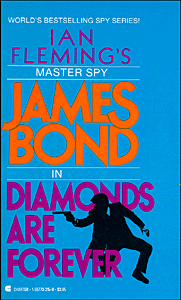
Just finished The Road by Cormac McCarthy. Pure genius.
antabanta posted:Just finished The Road by Cormac McCarthy. Pure genius.
You beat me on that one. ![]()
It's on my TBR list. I shall read it in the new year.
Gilbakka posted:antabanta posted:Just finished The Road by Cormac McCarthy. Pure genius.
You beat me on that one.
It's on my TBR list. I shall read it in the new year.
![]() You're beating me to a lot more. In case you don't know, he doesn't use quotes for dialog. I thought it would be a big problem when I started All The Pretty Horses but it wasn't.
You're beating me to a lot more. In case you don't know, he doesn't use quotes for dialog. I thought it would be a big problem when I started All The Pretty Horses but it wasn't.
Finished reading REVOLUTION IN THE REVOLUTION? By Régis Debray. This book discusses armed struggle and political struggle in Latin America during the 1950s and 1960s. Fidel Castro’s successful revolution in Cuba in 1959 inspired leftists throughout Latin America to take up arms against dictatorial regimes embraced by US political and economic interests.
French-born Debray arrived in Cuba in 1961, met Castro and other guerrilla fighters, and observed closely the workings of the revolution. He was granted access to numerous unpublished documents directly related to the 1956-58 insurrection.
Later Debray spent long periods in South America, studying radical political parties, movements and guerrilla fronts. He noticed that some of them were employing strategy and tactics copied from earlier armed struggles in Russia, China, Vietnam and Spain that were basically unsuitable for Latin America. He believed the Cuban model was more relevant.
“Revolution in the Revolution?” was first published in 1967. I had read it in my youth but couldn’t grasp everything at that time. Now, reading a recently published 50th anniversary edition, I have a fuller appreciation of the book which is regarded among leftist circles as an important historical document.
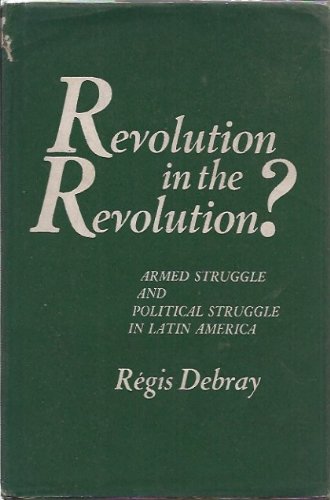
Finished reading WHAT HAPPENED by Hillary Rodham Clinton. Published recently, this memoir recalls what happened during the 2016 US presidential election campaign. From Hillary Clinton’s standpoint, of course.
The last election had promised to be historic, if only the first woman president had been elected. Alas! Donald Trump became president although Mrs Clinton received 2.9 million more votes than he got.
In this book Mrs Clinton blames her loss on, firstly, excessive news media coverage of her personal emails; her emails got three times more coverage than all other issues affecting people’s lives combined. Secondly, she says Russia carried a massive misinformation campaign against her and violated US sovereignty by interfering in the presidential race. Thirdly, she asserts that Republicans let loose an avalanche of fake news against her person, Barack Obama and other Democrats. Fourthly, she says, sexism is still a dominant force in American politics; millions of people harbor a conviction in this 21st century that a woman must not govern in the White House.
Hillary Clinton is also self-critical in her memoir. “I’ve tried to give an honest accounting of when I got it wrong, where I fell short, and what I wish I could go back and do differently. This isn’t easy or fun. My mistakes burn me up inside.”
Though this is a political memoir, it is readable to the average person. And instructive too, regarding the American system.
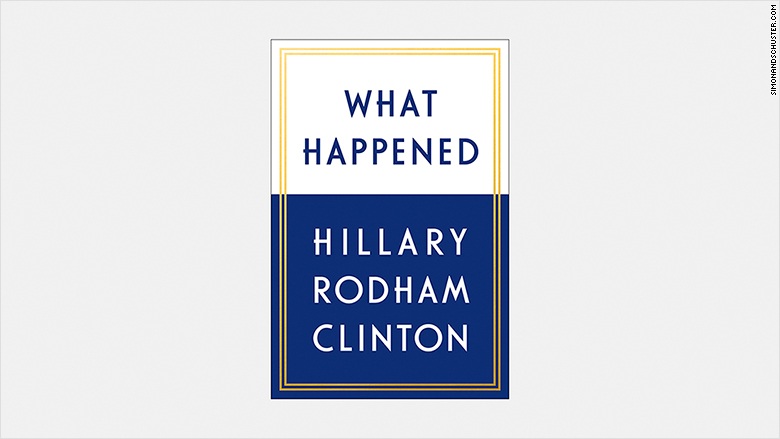
After starting it more than a month ago, I’ve finished reading the 784-page “NO HIGHER HONOR: A Memoir of My Years in Washington” by Condoleeza Rice. Under President George W. Bush, Ms Rice served as the first female African American Secretary of State. Before that she was President Bush’s National Security Adviser.
The Bush years 2001-2008 were marked by some startling events: The 9/11 terrorist attack in New York. The US invasion of Afghanistan and Iraq and the overthrow and killing of Saddam Hussein. The assassination of Benazir Bhutto in Pakistan. Islamic terrorist attacks in India. The emergence of Iran and North Korea as nuclear-weapon-capable states. Bloody regional conflicts in Georgia, Russia and Sudan. And other pressing international disputes that required frequent long distance air travel by the US Secretary of State.
Condoleeza Rice’s memoir reads like a diary of her busy schedules in the White House, the State Department, and foreign capital cities. Before reading this book I was one of those persons who thought President George W. Bush was a dummy. I don’t think so anymore. On the contrary, I now view him as an intelligent and practical man.

Finished reading A CARIBBEAN MYSTERY by British crime writer Agatha Christie. This novel was first published in 1964 when, excluding Jamaica and Trinidad, the West Indian islands were still colonies.
It is set on a fictional island, St Honoré, where a British couple own and operate the Golden Palm resort. One popular cocktail among guests is called Planters Punch --- a mixture of dark rum, lemon juice, syrup and Angostura bitters.
Guests are tourists and expatriates from Britain, North America and Venezuela. A notable guest is old Miss Jane Marple who, having survived a bout of pneumonia in England, is recuperating on the island. She is the story’s unofficial detective character.
One guest, a retired British Army Major who had served in colonial India and Kenya, is murdered suddenly in his bungalow one night. That tragedy is swiftly followed by the killing of a Golden Palm employee and another guest. Miss Marple takes it upon herself to figure out the identity of the killer. Who? That’s the Caribbean mystery.

Finished reading HOMBRE by Elmore Leonard. This is a western/cowboy novel set in Arizona in 1884. The main character, John Russell, is a brave and cool Apache Indian who grew up among whites. Russell has a few aliases including ‘Tres Hombres’ and ‘Hombre’.
The book was first published in 1961 and six years later a movie based on it was produced, starring Paul Newman. That movie was screened in Guyana and a Portuguese guy was so impressed that when he opened a gents boutique on Robb Street between Hinck Street and Avenue of the Republic in the early 1970s he named it HOMBRE.
I like Elmore Leonard’s writing style. Sixteen years ago I read another of his westerns, CUBA LIBRE.

Gilbakka posted:Finished reading HOMBRE by Elmore Leonard. This is a western/cowboy novel set in Arizona in 1884. The main character, John Russell, is a brave and cool Apache Indian who grew up among whites. Russell has a few aliases including ‘Tres Hombres’ and ‘Hombre’.
The book was first published in 1961 and six years later a movie based on it was produced, starring Paul Newman. That movie was screened in Guyana and a Portuguese guy was so impressed that when he opened a gents boutique on Robb Street between Hinck Street and Avenue of the Republic in the early 1970s he named it HOMBRE.
I like Elmore Leonard’s writing style. Sixteen years ago I read another of his westerns, CUBA LIBRE.
Love that story. Other blockbuster movies based on Elmore Leonard's books include Valdez Is Coming, Get Shorty, 3:10 To Yuma, Mr. Majestyk starring Charles Bronson.
Finished reading WHY BAD GOVERNMENTS HAPPEN TO GOOD PEOPLE by Danny Katch. Published earlier in 2017, this book tries to explain why and how Donald Trump hijacked the Republican party and became President of the United States.
“The election of Donald Trump has sent the United States and the world into uncharted waters, with a bigoted, petty man-child at the head of the planet’s most powerful empire. Danny Katch indicts the hollowness of the US political system that led to Trump’s rise and puts forward a vision for a real alternative: a democracy that works for the people.” So says a blurb on the book.

Finished reading THE HEART OF THE MATTER by Graham Greene. First published in 1948, this novel is set in the West African British colony of Sierra Leone during the Second World War. Green worked as a British Foreign Service Officer in Sierra Leone during 1941-43 and his experience there prompted the novel.
Its central character is Scobie, Deputy Commissioner of Police and a devout Catholic. He is in the colony 15 years already. He is honest and committed to maintaining order and justice. But he is in a loveless marriage that produced a daughter who died young.
Mrs Scobie feels unwanted in Sierra Leone and suggests to her husband that they go back to England or someplace else. He prefers to stay in Sierra Leone. Mrs Scobie asks him to send her to white-ruled South Africa for a vacation. He doesn’t have money and his bank rejected a loan request. He borrows the money from a notoriously corrupt Syrian businessman and later has to abandon his principles by abetting his benefactor in diamond smuggling and other illegal acts.
While his wife is in South Africa, Scobie starts a romantic relationship with a young widow and has constant pangs of guilt that torment his Catholic beliefs. A series of unfortunate events confront him and he says: “I carry suffering with me like a body smell.” All of which leads to a bad ending.
While reading this book I discovered the presence of West Indians in Sierra Leone. Curiously I googled and learned that in 1819 the British had deported Jamaican maroons and Barbadian rebels to that African colony, with Trinidadians following. In time those West Indians and their offspring became civil servants, journalists and other professionals there.

Finished reading CAUSE FOR ALARM by British spy fiction writer Eric Ambler.
Nicholas Marlow needs a job. He's engaged to be married and the employment market is pretty slim in Britain in 1937. So when his fiancé points out the Spartacus Machine Tool notice, he jumps at the chance. After all, he speaks Italian and he figures he'll be able to endure Milan for a year, long enough to save some money. Soon after he arrives, however, he learns the sinister truth of his predecessor's death and finds himself courted by two agents with dangerously different agendas. In the process, Marlow realizes it's not so simple to just do the job he's paid to do in fascist Italy on the eve of a world war.

This wraps up my reading for 2017. During the year I finished reading 54 books, 42 by male authors and 12 by female authors. Out of the total, 4 were Classics.
Finished reading STALINGRAD: The Fateful Siege 1942-43 by British military historian Antony Beevor.
The Battle of Stalingrad marked a crucial turning point in Adolf Hitler’s military campaign in the former Soviet Union during the Second World War.
The Nazis had captured a big part of the country in the west and planned to grab oil fields in the Caspian Sea basin but Stalingrad was an obstacle which had to be removed first. The city bearing Soviet leader Josef Stalin’s name put up one of the most outstanding defences in military history and successfully routed the Germans and their allies. The Soviet Union paid a heavy toll for that victory. It lost 478,741 men, 2,769 aircraft, 4,341 tanks, 15,728 guns and other casualties. After Stalingrad, the Nazis were pushed back mile by mile all the way to Germany.
In his book, Antony Beevor presents situation reports from both sides in the battle with information from official documents as well as combatants’ personal diaries, letters and testimonies. Since its publication in 1998, “STALINGRAD” has been translated into 18 languages and won two awards.
On a personal note, I visited Stalingrad, now renamed Volgograd, in 1984 and saw some locations where intense fighting had occured: Mamayev Hill, Pavlov’s House, and the former Gerhardt Flour Mill which has been preserved as it was in 1943.

Finished Invisible Man by Ralph Ellison - an American classic depicting the plight of the black man as a non-entity, an unseen and unacknowledged human being. Excellent writing.
Finished reading THE WAY THINGS WERE by Aatish Taseer, a British-born writer whose mother Tavleen Singh is a veteran journalist in India, and whose father Salmaan Taseer served as Governor of the Punjab in Pakistan before being assassinated in 2011.
This novel, published in 2015, is set primarily in India. It opens with the 2013 death in Europe of Toby Kalasuryaketu, a former rajah [prince] and dedicated Sanskritist. Toby’s son Skandu, living in the US, takes his cremated remains to India. It’s a journey into family and national history, intertwined. From 1975, the year Prime Minister Indira Gandhi declared a state of emergency and curtailed democratic freedoms and human rights; the same year Toby rajah married Skandu's mother, daughter of a retired Sikh brigadier in the Indian Army. Through 1984, when Mrs Gandhi was assassinated by a Sikh bodyguard, and when Toby and his wife separated because he loved the Sanskrit language more than he loved her. To 1992, when Hindu fanatics destroyed the 16th century Babri mosque in Ayodhya, and when Toby left India for good with his second wife, a foreigner and soulmate.
The main characters in this novel, including the women, are high society Indians who read serious literary fiction, and who in their conversations refer to authors like VS Naipaul, Salman Rushdie, Charles Dickens, Gabriel Garcia Marquez etc.


Finished reading THE JAGUAR SMILE by Salman Rushdie.
In 1986, on the occasion of the 7th anniversary of the Sandinista revolution, Salman Rushdie visited Nicaragua for three weeks, a guest of the Sandinista Association of Cultural Workers.
Rushdie toured a large part of Nicaragua, both on its Pacific and Atlantic sides. He met with President Daniel Ortega, Vice-President Sergio Ramirez [a writer], Culture Minister Ernesto Cardenal and even oppositionists like Violeta Chamorro who later became President after the fall of the Sandinistas in 1990.
“The Jaguar Smile”, Rushdie’s first non-fiction book, is about that trip to Nicaragua.
Access to this requires a premium membership.